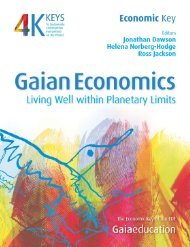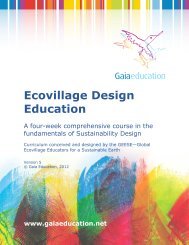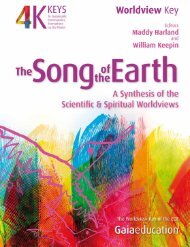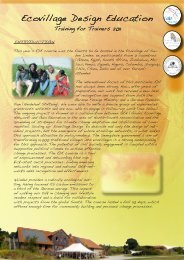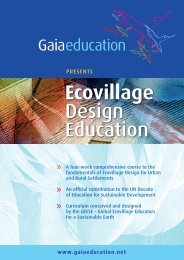Designing Ecological Habitats - Gaia Education
Designing Ecological Habitats - Gaia Education
Designing Ecological Habitats - Gaia Education
You also want an ePaper? Increase the reach of your titles
YUMPU automatically turns print PDFs into web optimized ePapers that Google loves.
getting tHe worD out on sustainability innovations – via amateur raDio 153<br />
to amateur ‘ham’ radio communication systems and related community<br />
service benefits. As such, I have come to recognize the prospective value<br />
and importance of AR to individual, neighborhood, community, regional<br />
and global efforts at sustainability.<br />
I have been a licensed AR operator since 1990, and currently hold the top<br />
U.S. Amateur Extra Class license. My home radio station is comprised of<br />
both older and new equipment and powered by a solar photovoltaic system<br />
I designed and installed to provide a redundant (and clean) energy source.<br />
I am an accredited Volunteer Examiner (VE) to support testing sessions<br />
for licensing new AR operators and co-direct Seattle Amateur Radio Training<br />
courses. I also volunteer for the Auxiliary Communications Service within the<br />
City of Seattle Department of Emergency Management and am affiliated<br />
with many radio clubs and organizations.<br />
Over the years, I have met AR operators from all over the world and<br />
have learned much from them about their cultures, communities and<br />
shared interests in sustainability and appropriate technologies – typically<br />
over fantastic meals! So, along with the fun of the hobby, the advancement<br />
of technical knowledge and the contributions to emergency services and<br />
preparedness, new roles are emerging for the approximately four million<br />
international AR operators and their skills. With scalable investments in<br />
equipment and depending on license class (which defines privileges for<br />
access to bands and modes of transmission), AR operators communicate<br />
with others around the world (and around their local communities) using<br />
voice, Morse code, and/or other modes of digital data including teletype,<br />
fax, slow-scan TV and others.<br />
Why Amateur Radio when we have the Internet and Cell Phones?<br />
Amateur radio is a world-wide service like no other. Generations of radio<br />
operators have been demonstrating leadership in creating relationships,<br />
organizations and actual prototypes underpinning today’s common<br />
communication systems. The term ‘amateur’ should not imply second<br />
rate; the skills, services and technological developments of volunteer AR<br />
operators are often equal to those expected of paid professionals. Their early<br />
creations have included now-common tools as email and internet systems,<br />
cell phone systems, computer and digital data technologies, among others.<br />
Also, AR operators do not ‘broadcast’ to anonymous audiences (like<br />
commercial radio stations); rather, they transmit person-to-person to other<br />
licensed operators identified by their unique call signs. AR operators hold<br />
on-air educational and public service nets, discuss science, culture, weather and<br />
so on, but do not play music, conduct business or other activities as a commercial<br />
broadcast station might. So, why should we consider amateur radio for<br />
advancing sustainability when so many other communication tools exist?<br />
AR can be usefully deployed in service of timely Transition Town<br />
(Hopkins, 2008) efforts, where community sustainability programs are<br />
coordinated for post-peak oil resiliency. Establishing reliable, decentralized



